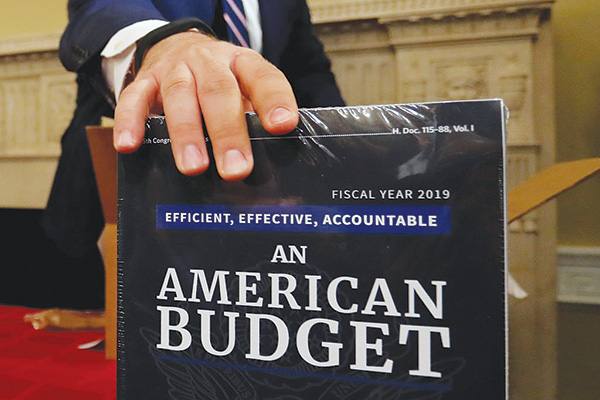Trump budget seeks to gut government workers’ union benefits
Trying to legislate what courts have already rejected

The old saying “Actions speak louder than words” shows the true intent of the Trump administration. The contrast between how the President professes to support workers and his proposed budget, which guts federal workers’ protections, and his announced support for a national “right-to-work” law, makes it abundantly clear.
Trump has submitted his 2020 budget and is using it to enact a series of changes to the federal workforce. Many of the provisions included in the budget seek to legislate executive orders that the courts have recently struck down, including cuts to annual leave and retirement security, pay freezes and a weakening of collective bargaining rights.
In his budget blueprint, Trump is again proposing across-the-board cuts for federal workers.
Trump has repeatedly tried to freeze the pay of civilian government employees but has consistently been thwarted by Congress. A pay increase for federal workers was negotiated in February as part of the budget deal to re-open the government, but it only provided funding for the raises through September 30.
“Clearly the administration learned nothing from the disastrous 35-day partial government shutdown,” said National Treasury Employees Union National President Tony Reardon in Government Executive. “The American people know full well that federal agencies need resources and federal employees deserve a fair paycheck, and this budget proposal—essentially a blueprint for how to ruin the civil service—provides neither.”
Trump’s budget also proposes changes to the Federal Employees Retirement System and the Civil Service Retirement System by:
- Increasing employee contributions.
- Eliminating cost-of-living adjustments.
- Changing annuity calculations for retirement from using the highest three years of work to five – effectively lowering the amount a retiree would have to live on.
- Eliminating a supplement for those forced to retire early.
 According to an independent investigation from Vox, these changes would cost the average federal worker $75,000 in retirement savings, which equates to nearly a year’s salary being taken from federal workers’ retirement savings.
According to an independent investigation from Vox, these changes would cost the average federal worker $75,000 in retirement savings, which equates to nearly a year’s salary being taken from federal workers’ retirement savings.
SCRAPPING COLLECTIVE BARGAINING AGREEMENTS
The budget proposal would also try to “modernize the civil service” by scrapping the language of collective bargaining agreements. The budget attempts to:
- Codify Trump’s unconstitutional executive order from 2018 that would shorten to 30 days, from the contractually agreed 120 days, the time which an employee would have to improve their performance before being fired. Trump’s attempt to enforce the change through executive order was struck down by a federal judge.
- Resurrect another invalidated executive order that would narrow the scope of grievance procedures for bargaining unit employees.
- Reduce the overall number of paid leave days.
- Trump’s budget attempts to force through all of these changes despite the fact that these issues have already been collectively bargained and cannot be changed without a new collective bargaining agreement or a new law being passed in Congress.
In addition, the budget includes a 31 percent cut to the Environmental Protection Agency (EPA) budget that could result in 2,000 positions being unfilled in 2019.
‘DEAD ON ARRIVAL’
Thankfully, with a Democratic majority in the House, the budget bill is essentially dead on arrival.
House Majority Leader Steny Hoyer (D-MD) told the Washington Post the budget bill is “nonstarter.”
In contrast, Congressional Democrats have proposed a plan that would increase the value of retiree inflation adjustments, end restrictions on payouts to those retired under their retirement system, and implement a 3.6 percent raise in January 2020
(Source: Union Communications Consulting Services [UCOMM] blog.)


Leave a Reply